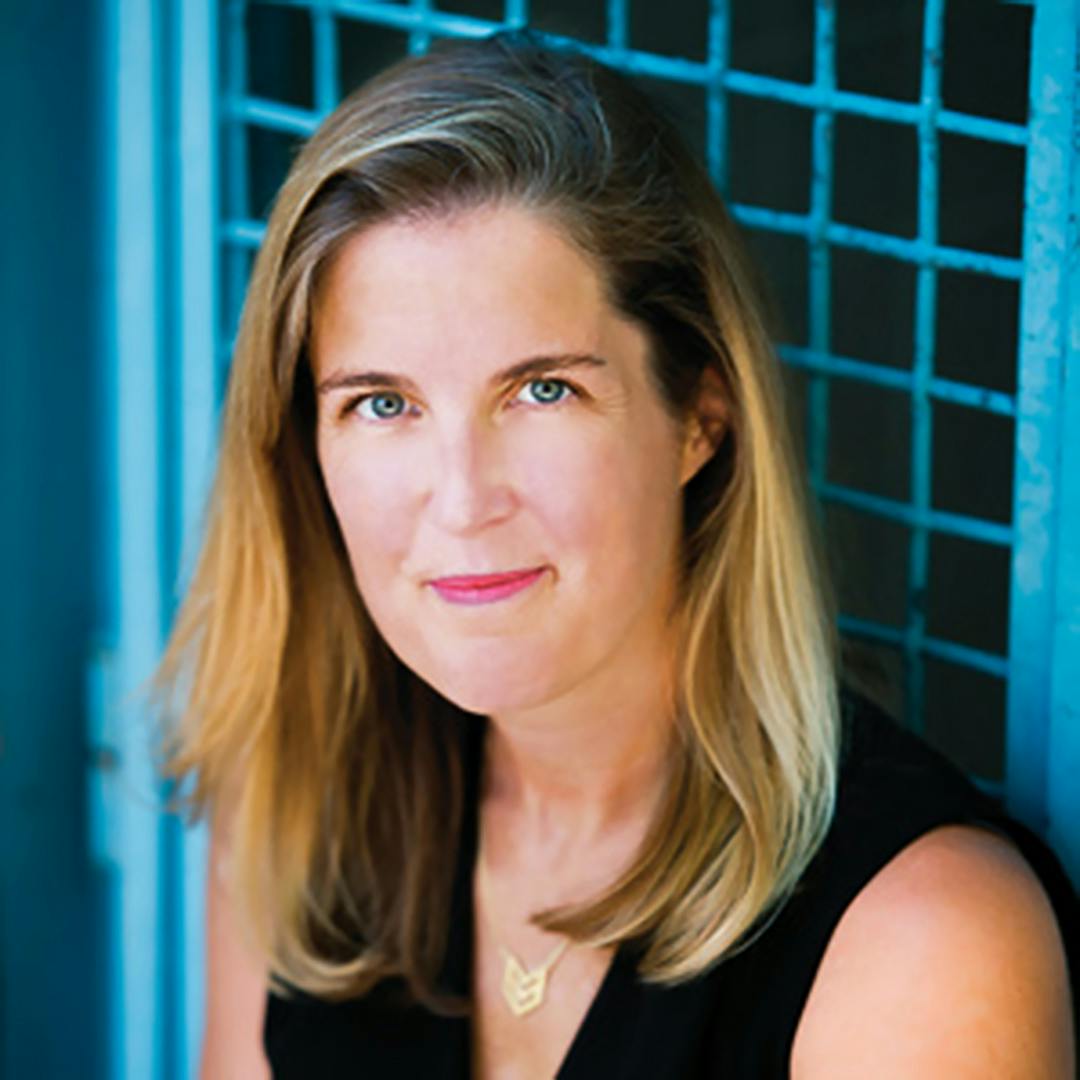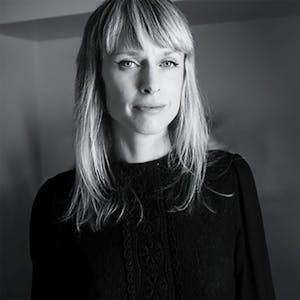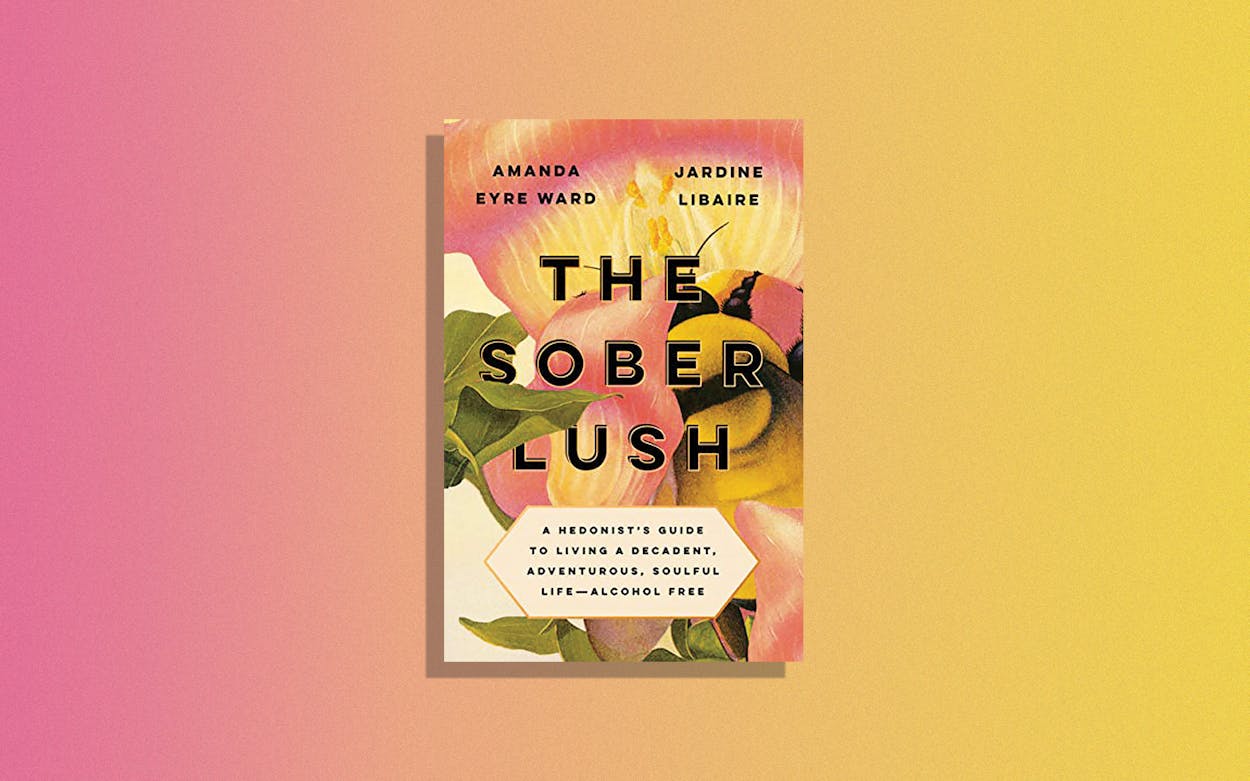Many books tackle the question of whether a person needs to quit drinking, but not enough answer the question of what to do instead. For any brave soul ready to hang up their wine glass, the world can feel like a gaping hole. Where to put your hands? What to do on Friday? Tuesday? Any day ever? The Sober Lush: A Hedonist’s Guide to Living a Decadent, Adventurous, Soulful Life—Alcohol Free (TarcherPerigee) fills in those blanks. Written by Amanda Eyre Ward and Jardine Libaire, two fortysomething women who became friends in Texas, the book points the way toward life after booze, with short breezy chapters that describe such eclectic delights as zero-gravity float tanks (have not tried) and ASMR videos on YouTube (did try, recommend). There are sections on play, creativity, magic, love, consciousness-expansion, and more. So many people fear sobriety will be the end of joy, but it is often a whole new beginning.
Ward is an Austin author whose latest novel, The Jetsetters, about a family on a cruise ship while the father struggles to stay sober, became a New York Times best-seller and a Reese Witherspoon book club pick when it was released earlier this year. Libaire, who lived in Austin for years before moving to Los Angeles, is the author of the acclaimed 2017 novel White Fur and is cowriter of the romantic drama Endings, Beginnings, which stars Shailene Woodley as a woman who recently quit drinking; it came out in May. Both writers have been sober for several years. All that mythology about creative people having to drink to excess? It’s a total lie.

Both Ward and Libaire are friends of mine, and I blurbed this book. I want to get all my conflicts of interest on the table, but I also want to express my desire for people to share The Sober Lush, because it’s the kind of practical instruction and sincere hope many of us need in those shaky early months when we feel exiled from the kingdom. I spent my first year of sobriety gorging on television and tins of lasagna, but eventually I saw that binging and hiding would not cut it; I had to engage with the world.
“Are you curious about living a giant, dirty, wild, glamorous life without consequences of numbness or regret?” the book’s introduction asks. I was, and I know I’m not the only one.
The Sober Lush enters the world at a fraught moment. We are all getting sober in certain ways. Whether confined to our homes or witnessing the soul-sickness of our country, this is a bracing and singular time. You do not need to have a drinking problem to benefit from the wisdom of The Sober Lush; its lessons are useful to any human seeking that most noble of goals—a richer life. I recently caught up with Ward and Libaire after the book’s June release.
Books on sobriety tend to be memoirs, or books about how to quit, or maybe current theories on addiction. Why did you go in this direction?
Amanda Ward: I tried to get sober for a while. I went to meetings, but I wasn’t sure how to build the life I wanted without alcohol. I remember going to Jardine’s house for the first time. She had beautiful music playing and this French-pressed coffee in china cups, and her dog was curled up, and I thought, okay. I want this. I want a glamorous, sensuous life. So I wanted to write a road map to a life I was still trying to figure out. Kind of like writing a map while you’re still wandering.

Jardine Libaire: I knew I should be sober in my twenties. I furtively looked for things to read, because I was too shy to talk to people and reading was the way to do it without “outing myself.” All I could find was Pete Hamill’s A Drinking Life. It wasn’t what I could relate to. In our generation, we’ve seen that library of books about drinking grow. I love that the library is so much bigger now, and this was a piece we could contribute.
This book has the unintended consequence of being something that might help people stuck inside during a pandemic. Have you had the same thought?
JL: Very much. It’s interesting how many articles about what to do in quarantine remind me of what we wrote about. This is a huge reeducation for our society on how we handle connection and solitude and family and work.
AW: It mirrors the journey I took in early sobriety, where I realized I couldn’t just live in the same life and go to the same parties and drink club soda. For a long time, I tried to get sober by keeping everything the same but not numbing myself. And with the help of Jardine, I decided to blow my life up and see which pieces didn’t fit anymore. Much like quarantine, we just can’t rely on the shortcuts we’ve always had to be happy. We have to become detectives and figure out what works for us and why in order to build a life of connection and joy.
Can each of you talk about your fears of sobriety? What kept you from quitting?
JL: I would try thirty days, sixty days, and fall off. I was afraid of being the rain-on-the-parade party guest. I was really caught up in how I pleased or did not please other people. Sobriety wasn’t just about substances, but also about: Am I confident enough to be who I am? Do I say what I want? Or do I have to bow to some social protocol? And then a further layer was wondering if that social protocol even existed or was just in my mind? It was an epiphany to see so many problems I had with drinking were tied up with other stuff about feeling welcome.
AW: I had built my life around alcohol. My friends drank a lot. I had dinners where we all drank wine; I loved traveling and drinking. So I was scared. I saw myself as this brash wild girl who could drink you under the table, but I’m not—I just didn’t know who else to be. I had to start over. I get tired these days at nine-thirty or ten p.m., and I want to read, and I don’t want to go to the parties, and I didn’t know that I could live this life.
I like that the book presents sobriety as a discovery process. In some ways, it’s also a rediscovery process. Can you talk about some of the discoveries that surprised you?
JL: I feel like every single chapter had some nook or cranny of sobriety that I’d never articulated. I’d gone to this tea store in Santa Fe, and it was full of canisters with handwritten labels and they were gorgeous and reminded me of poetry. I wandered out without buying anything; I just wanted to see the work that other people were doing and be inspired. We uncovered so many of those moments.
AW: I was wasting so much energy on moderating and asking whether I was an alcoholic and whether I would drink that night. Could I have three glasses and go home? When I finally gave up, and realized it was not worth the battle, I just had so much more brainpower. Writing this book last summer was wonderful because I was at my mom’s house with my kids, and every day I’d have an excuse to do some incredible thing. A tarot reading, for instance. It was amazing how much energy I’d spent trying to keep chardonnay in my life.
There’s been a growth of sobriety as a lifestyle, more like a wellness trend. Can you talk about how you see the “sober curious” movement and the changes you’ve seen in how we talk about drinking problems?
JL: I love that the stigma is diminishing. And while I do love the sober curious movement, I also don’t want to make light of addiction, because for so many people, this is life or death. I just want to be clear this book is not about, oh, do a wildflower honey tasting and you’ll get sober.
AW: I find the sober curious movement bewildering. There was nobody I knew when I was younger who was sober because it was healthier. You either could hold your liquor or you couldn’t. I remember reading Caroline Knapp’s Drinking: A Love Story and thinking, okay, so she got this bad, and if I don’t get that bad, I don’t have to quit. So I’m glad there’s some conversation around the idea that maybe a life without numbing agents is more beautiful, no matter whether you could handle them or not.
JL: I think it opens a door that was not opened before.
AW: You can go out to dinner and have these zero-proof cocktails now. The first year I quit, I had to explain to every waiter why I was having Perrier, but I’m over that now. I did ask this one bartender to make me a mocktail, and he was like, “All the taste is in the alcohol.” And I was like, really?
I used to hear that more than I do these days. I think bars have finally realized people will pay premium prices for drinks that don’t even have alcohol. I’m curious what your favorite nonalcoholic drinks are.
AW: I drink this spicy ginger beer, and I put Rose’s grenadine in it. The brand is the Great Jamaican Ginger Beer. My kids take a sip, and they’re like ugh, that’s strong. I’m like, yeah, I always liked ’em strong.
JL: I actually like the supermarket nonalcoholic wines like Fre. If there’s an intimate group or a party of people I don’t know well, it’s nice to be connected in a way where you’re sharing food and drink. There’s something about that. And I’m kind of in love with these botanical elixirs that are nearly fairytale-like, with clementine and sage and these gorgeous labels, like Curious Elixirs and Proteau. They remind me of when I first discovered alcohol—Johnny Walker Red. I still fetishize drinks, even if that drink is tea.
I’ve always felt a little weird about the fact that I kept my wineglass. It’s this crystal goblet, and I drink seltzer in it sometimes, because why do I have to give up presentation just because I gave up a substance? I understand that might be triggering for some people. But if it’s not, and it helps you feel less deprived, what’s the problem?
JL: I think it goes back to that old question: Am I substituting, or am I rediscovering?
A lot of the book is written in second-person plural, the “we” voice. Can you talk about using that?
JL: I think it was the idea that we we were presenting a kind of no-walls collective where people could come and go. It’s not us and them, drinkers versus sober people, like twenty years ago.
AW: From a craft perspective, the writing felt lesser when it was first person. For me, as soon as something wasn’t fictional, it fell apart. But when one of us, and I don’t remember who, wrote in the “we” voice, it was like, we have to keep going. And saying “we” gave me confidence. Walk out of that party. You can do it! And I was like, yeah, that’s what I need to hear.
People say this would be a hard time to get sober, but I think quitting drinking sucks in any season, so why not do it now, when the world has come to a crawl?
JL: I’m kind of surprised that’s not the trend. Instead I keep seeing stories on drinking going way up. But I wouldn’t be able to handle it. The anxiety that drinking created for me, I would just implode.
AW: How would you moderate if you were stuck at home? I couldn’t.
And then the acquisition. How to get the booze? Do the neighbors see the delivery?
AW: If I run out of my ginger beer, I’m like, dammit.
JL: I have friends going through this. I wish there were a magic way to convince someone what they’re holding onto just isn’t that great, but for each person, it’s their own journey.
You can never give that knowledge to someone else. But it helps to see sober women living full lives. I’m struck by the story Amanda told about Jardine’s place. It’s the logic of AA: I want what you have. And that’s how drinking works too. This person looks free, I want the freedom you have. People enter the drinking life like that, and they come out of the drinking life like that, too.
AW: I do hope that some twentysomething woman might read this and think, okay, I don’t have to go to the bar with the guys and just get fucked up. There is another way.
This conversation has been edited for clarity and length.
Sarah Hepola is a Texas Monthly contributor and author of the New York Times best-seller Blackout: Remembering the Things I Drank to Forget (Grand Central Publishing). She lives in Dallas.






